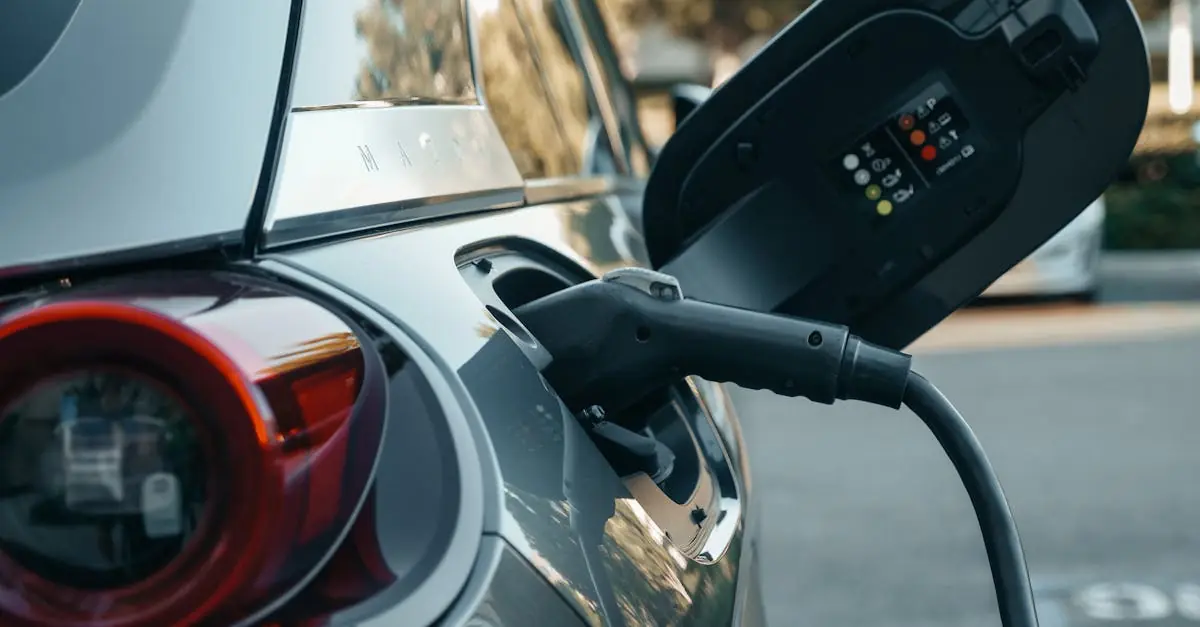Electric vehicles are the future, but even the most advanced tech needs a little TLC now and then. When your EV battery starts to show signs of fatigue, it’s like finding out your favorite coffee shop ran out of espresso—utterly devastating! But fear not, because getting that battery replaced doesn’t have to be a daunting task.
Table of Contents
ToggleOverview of EV Battery Replacement
Electric vehicle (EV) battery replacement involves several key factors. Vehicle owners often face the challenge of identifying the right service center. Many dealerships specialize in battery replacements, offering expertise in their specific makes and models. Independent mechanics also provide battery replacement services, frequently at competitive rates.
Replacement costs vary based on the vehicle and battery type. Some batteries range from $5,000 to $15,000, depending on the manufacturer and capacity. Warranty coverage plays a crucial role in determining overall expenses, as some EV batteries are under warranty for eight years or 100,000 miles.
Finding a reliable service center is essential for ensuring quality work. OEM (original equipment manufacturer) parts guarantee compatibility, while aftermarket components may offer lower prices but could affect performance. Owners must assess their budget and performance needs before making a decision.
Scheduling battery replacement is often straightforward. Many dealerships and service centers allow online appointments, simplifying the process. Expected wait times can vary, with some replacements taking a few hours while others may require a full day.
Assessing battery health beforehand allows for proactive planning. Regular checks of battery performance indicators can help identify potential issues before they escalate. When replacing an EV battery, documentation of the process ensures transparency and future reference.
Consumers can also explore recycling programs for their old batteries. Many manufacturers offer recycling options to minimize environmental impact. By following these steps, EV owners can navigate the replacement process with confidence, ensuring their electric vehicles remain reliable and efficient.
Factors to Consider When Replacing EV Batteries
Several important factors influence the decision to replace an EV battery. Understanding these can lead to a smoother experience.
Cost of Replacement
Replacement costs typically range from $5,000 to $15,000, depending on the EV model and the service center chosen. Major factors affecting the cost include the battery’s capacity and whether genuine OEM parts or aftermarket options are used. OEM parts often ensure better compatibility and performance, resulting in higher prices. Certain EVs, such as luxury models, may incur additional expenses due to advanced technology. Considering potential savings through warranty coverage is essential, as it may significantly reduce out-of-pocket expenses for eligible EV owners.
Battery Warranty Options
Battery warranties usually last up to eight years or 100,000 miles. Coverage varies by manufacturer; some offer longer protection. Extended warranties may be available for customers seeking extra peace of mind. Reviewing warranty terms helps identify what services are included, such as labor or specific part replacements. Many manufacturers provide limited warranty options, granting additional security in case of premature battery issues. Thoroughly evaluating warranty conditions can ensure that unexpected costs don’t arise after replacement.
Where to Get EV Battery Replaced
Finding the right place for an EV battery replacement simplifies the process. Various options exist, each with unique advantages.
Authorized Service Centers
Authorized service centers specialize in specific EV brands, ensuring expert technicians handle repairs. These centers use OEM parts, guaranteeing compatibility and high performance. Customers often receive manufacturer warranty coverage, which can extend battery lifespan. While costs may run higher than independent shops, the peace of mind frequently justifies the expense. Schedule appointments easily through online platforms and enjoy efficient service designed for the vehicle’s needs. Many authorized centers invest in the latest diagnostic tools, making it easier to identify underlying issues.
Independent Repair Shops
Independent repair shops provide an alternative for battery replacement services. Typically, these shops offer competitive pricing, often lower than dealership rates. Skilled mechanics in independent facilities may have extensive experience with various EV models. While some use aftermarket components, checking for warranty compatibility is essential to avoid issues later. Customers benefit from a more personalized level of service, where mechanics often provide detailed explanations about repairs. Flexibility in scheduling also facilitates quicker service, as these shops may have more availability compared to authorized centers.
DIY EV Battery Replacement
Replacing an EV battery can be a feasible task for those with technical skills. Gather the necessary tools, including a socket set, screwdrivers, and safety equipment like gloves and goggles. Disconnect the car’s power first to prevent electrical shocks.
Next, access the battery compartment by removing protective panels. Consult the vehicle’s manual for specific steps related to the model. Take note of the battery’s specifications and ensure the replacement battery matches these.
Follow procedures for removal carefully. Detach cables and brackets holding the old battery in place. Lift the battery cautiously, as it can be heavy, and dispose of it through a certified recycling program.
Install the new battery by reversing the removal steps. Connect the cables securely, ensuring they’ve been tightened properly to avoid future issues. After installation, dispose of the old battery responsibly through local recycling initiatives.
Check battery functions after reconnecting the power. Verify that all systems are operational, and monitor the performance during the initial drives. If any warnings appear, seek professional assistance.
Considering safety and potential risks, many prefer professional help for this process. However, for those confident in their abilities, DIY battery replacement offers a practical solution to keep electric vehicles running efficiently and save on costs.
Environmental Considerations
Replacing an electric vehicle (EV) battery carries significant environmental implications. Manufacturing these batteries involves using resources such as lithium, cobalt, and nickel, which can lead to ecological harm if not managed responsibly. Battery disposal requires careful consideration due to the hazardous materials contained within.
Recycling programs become essential in mitigating environmental damage. Many manufacturers and service centers offer recycling options for old batteries, ensuring that valuable materials are recovered and reused. Such programs reduce landfill waste and lessen the demand for new resource extraction.
Additionally, sustainable practices in battery production can influence environmental outcomes. Some companies commit to using ethically sourced materials and eco-friendly manufacturing processes. Consumers should look for brands that prioritize sustainability in their operations, reducing the overall carbon footprint of their vehicles.
When opting for battery replacement, evaluating recycling facilities is crucial. Proper disposal through certified channels prevents toxic substances from contaminating soil and water. Various local and national programs exist, providing accessible ways for consumers to responsibly discard old batteries.
Environmental factors also play a role in the type of replacement battery chosen. OEM batteries often incorporate innovations aimed at enhancing efficiency and longevity. Although aftermarket options may be more affordable, the environmental impact of their production and lifecycle can vary significantly. Choosing OEM parts promotes sustainable practices while supporting manufacturers that adhere to higher environmental standards.
Making informed decisions regarding battery replacement helps minimize ecological footprints. Prioritizing sustainable materials, recycling, and responsible disposal aligns with broader efforts toward environmental conservation in the automotive sector. Every choice made contributes to a more sustainable future for electric vehicle users and the planet.
Replacing an EV battery is a significant step in maintaining the vehicle’s performance and longevity. With various options available from authorized service centers to independent mechanics and even DIY solutions, EV owners have flexibility in how they approach this task. Prioritizing quality and compatibility is essential to ensure optimal performance and warranty coverage.
Additionally, considering the environmental impact of battery disposal can guide consumers toward more sustainable choices. By staying informed and proactive about battery health, owners can navigate the replacement process with confidence. Ultimately, making educated decisions about where and how to replace an EV battery contributes not only to individual vehicle reliability but also to broader environmental efforts.



